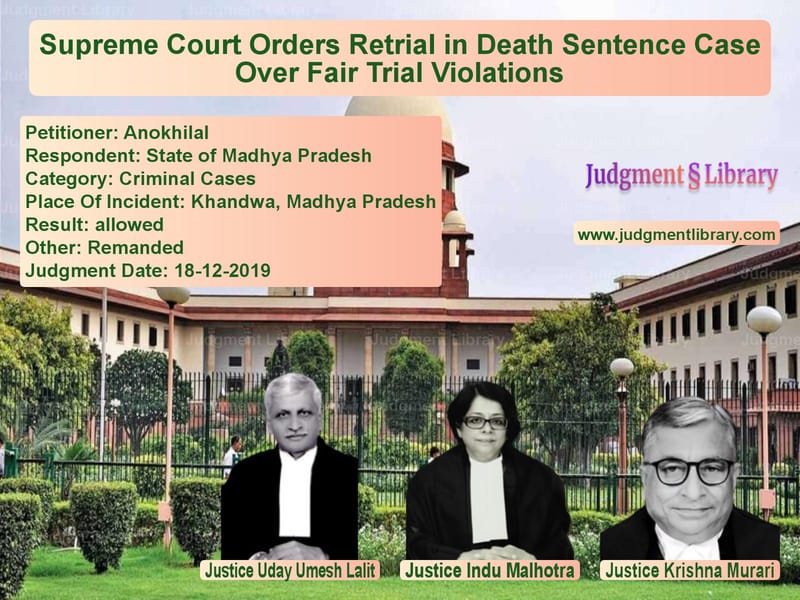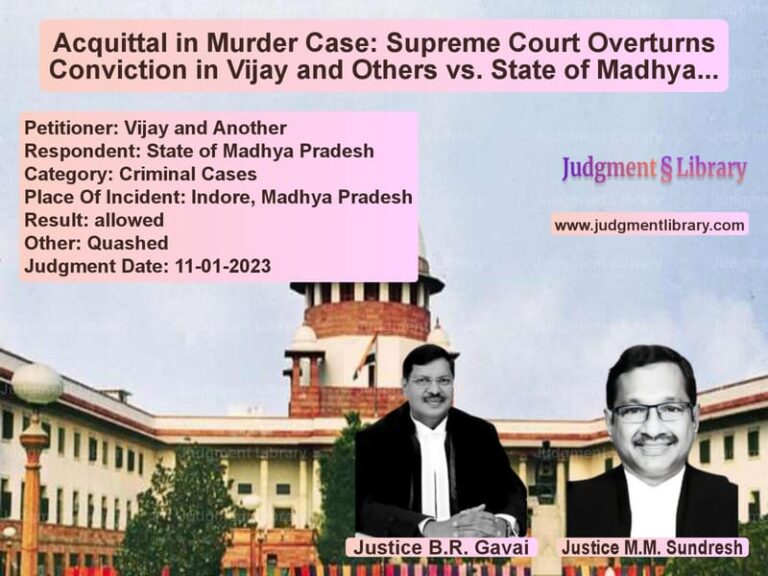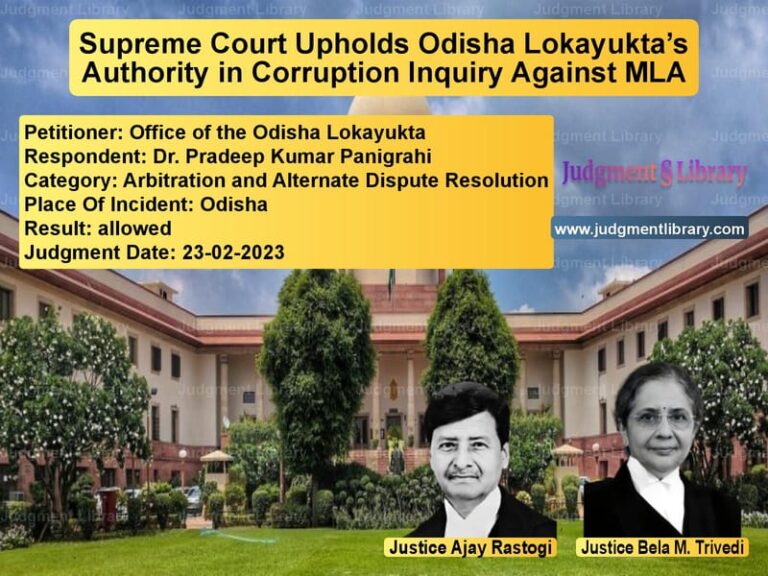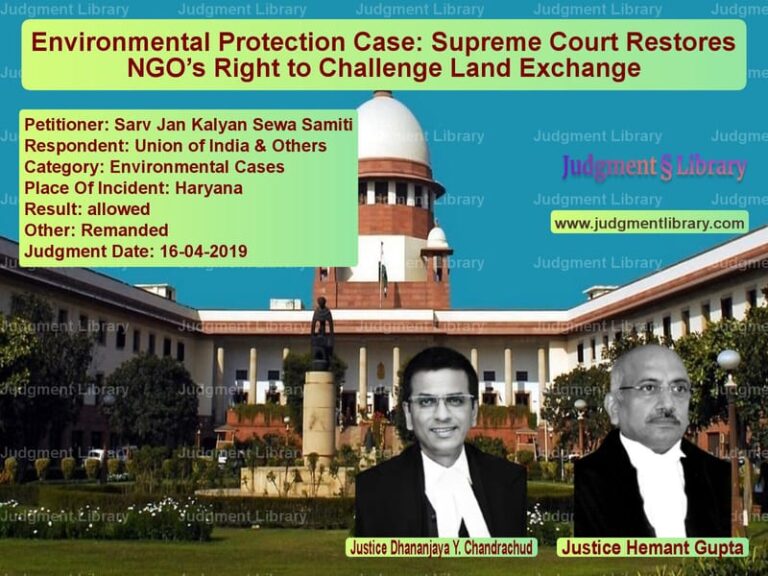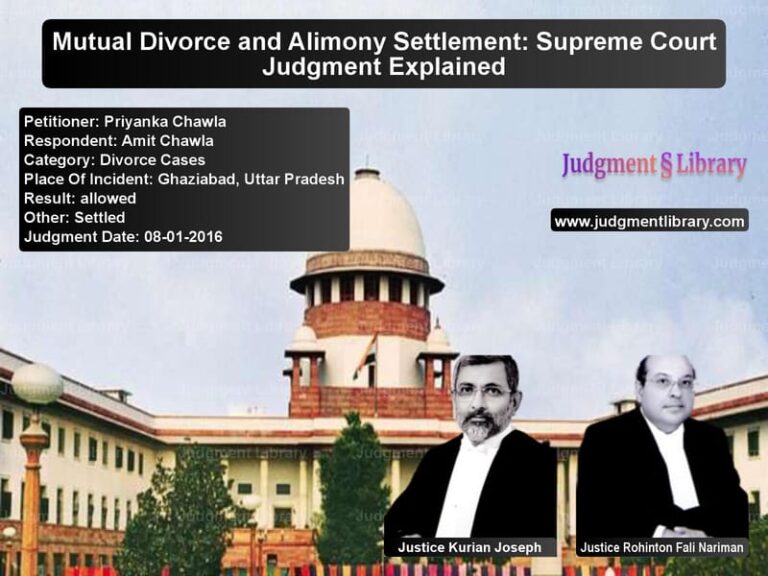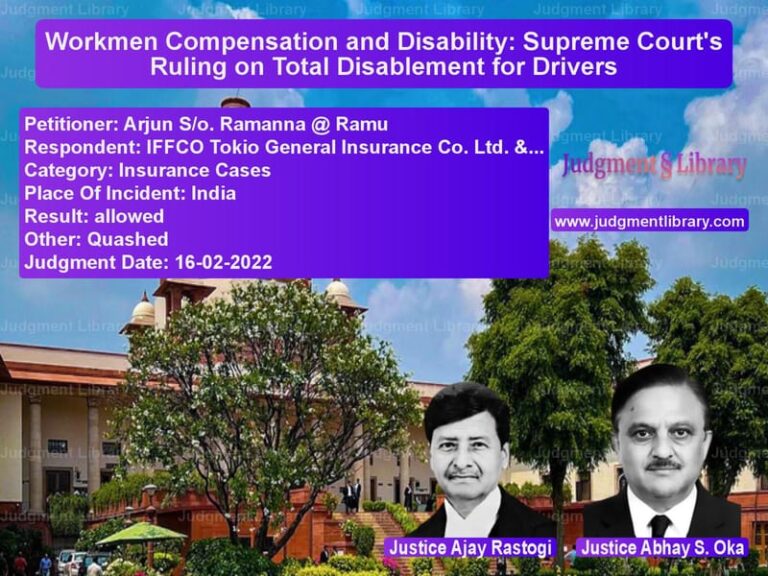Supreme Court Orders Retrial in Death Sentence Case Over Fair Trial Violations
The case of Anokhilal v. State of Madhya Pradesh is a landmark ruling concerning the right to legal aid and fair trial, particularly in death sentence cases. The Supreme Court, in its judgment dated December 18, 2019, overturned the death sentence imposed by the Madhya Pradesh High Court and ordered a retrial, citing violations of the accused’s right to legal representation and due process.
Background of the Case
The case stemmed from the tragic disappearance and murder of a nine-year-old girl in Khandwa, Madhya Pradesh, on January 30, 2013. The victim’s father, Ramlal, lodged a missing report after she failed to return home. The next day, her body was discovered in an open field, leading to the arrest of the appellant, Anokhilal, on February 4, 2013.
The police charged the accused under multiple sections of the Indian Penal Code (IPC), including:
- Section 302 (Murder)
- Section 363 (Kidnapping)
- Section 366 (Abducting to compel marriage)
- Section 376(2)(f) (Rape of a minor)
- Section 377 (Unnatural offenses)
Additionally, he was charged under Sections 4, 5, and 6 of the Protection of Children from Sexual Offences (POCSO) Act, 2012.
Trial Court Proceedings
The trial was conducted in an extremely expedited manner, raising concerns about fairness:
- The accused was provided legal aid only on February 19, 2013, the same day charges were framed.
- Within seven days, all 13 prosecution witnesses were examined.
- The DNA report was not presented until late in the trial, and the defense was not given adequate time to respond.
- The entire trial, including sentencing, was completed within a month, leading to a death sentence for the accused.
Petitioner’s Arguments
The appellant challenged the trial process on several grounds:
- His legal representation was inadequate, as the appointed lawyer had no time to prepare.
- The trial court did not follow due process in evaluating evidence, particularly forensic reports.
- The sentencing was conducted hastily without giving the defense a fair opportunity to present mitigating factors.
- The entire process violated Article 21 of the Constitution, which guarantees the right to life and fair trial.
Respondent’s Arguments
The State of Madhya Pradesh defended the conviction, arguing that:
- The evidence against the accused was overwhelming, including DNA matching and last-seen testimony.
- The expedited trial was conducted within the legal framework to ensure swift justice.
- The accused did not contest the forensic evidence at the appropriate stage.
Supreme Court’s Analysis
The Supreme Court critically examined the fairness of the trial and found multiple violations:
- The accused’s lawyer was appointed on the day of charge framing, giving him no time to prepare.
- Speedy trials must not come at the cost of fairness. The Court stated:
“The attempt to expedite the process should not be at the expense of the basic elements of fairness and opportunity to the accused.”
- The DNA report, a key piece of evidence, was introduced late in the trial without proper opportunity for the defense to challenge it.
- The trial court’s conduct violated previous Supreme Court rulings on the necessity of proper legal representation in capital punishment cases.
Key Legal Precedents Cited
The Court referred to several landmark rulings, including:
- Bashira v. State of Uttar Pradesh – Emphasizing the necessity of adequate legal representation.
- Mohd. Hussain v. State of Delhi – Holding that a trial without proper defense counsel is unconstitutional.
- Hussainara Khatoon v. State of Bihar – Establishing the right to legal aid as a fundamental part of Article 21.
Final Judgment
The Supreme Court overturned the conviction and ordered a retrial, directing that:
- The accused be provided with an experienced defense lawyer with at least ten years of practice.
- Any necessary modifications to the charges be made to ensure clarity.
- The defense be given sufficient opportunity to cross-examine witnesses and contest forensic evidence.
The Court concluded:
“Justice must not only be done but must be seen to be done. A trial conducted in a rushed manner, without adequate representation, cannot be called just.”
Impact of the Judgment
This ruling has far-reaching implications for criminal trials in India:
- It reaffirms the necessity of fair trials even in heinous crime cases.
- It establishes that death penalty cases require special procedural safeguards.
- It emphasizes the role of legal aid in ensuring justice.
- It sets a precedent that courts must balance speed with fairness.
Conclusion
The Supreme Court’s ruling in Anokhilal v. State of Madhya Pradesh underscores that legal representation and due process are non-negotiable rights, even in cases involving severe crimes. By ordering a retrial, the Court has reinforced the importance of procedural justice and the right to a fair defense.
Petitioner Name: Anokhilal.Respondent Name: State of Madhya Pradesh.Judgment By: Justice Uday Umesh Lalit, Justice Indu Malhotra, Justice Krishna Murari.Place Of Incident: Khandwa, Madhya Pradesh.Judgment Date: 18-12-2019.
Don’t miss out on the full details! Download the complete judgment in PDF format below and gain valuable insights instantly!
Download Judgment: Anokhilal vs State of Madhya Prad Supreme Court of India Judgment Dated 18-12-2019.pdf
Direct Downlaod Judgment: Direct downlaod this Judgment
See all petitions in Murder Cases
See all petitions in Bail and Anticipatory Bail
See all petitions in SC/ST Act Case
See all petitions in Judgment by Uday Umesh Lalit
See all petitions in Judgment by Indu Malhotra
See all petitions in Judgment by Krishna Murari
See all petitions in allowed
See all petitions in Remanded
See all petitions in supreme court of India judgments December 2019
See all petitions in 2019 judgments
See all posts in Criminal Cases Category
See all allowed petitions in Criminal Cases Category
See all Dismissed petitions in Criminal Cases Category
See all partially allowed petitions in Criminal Cases Category

